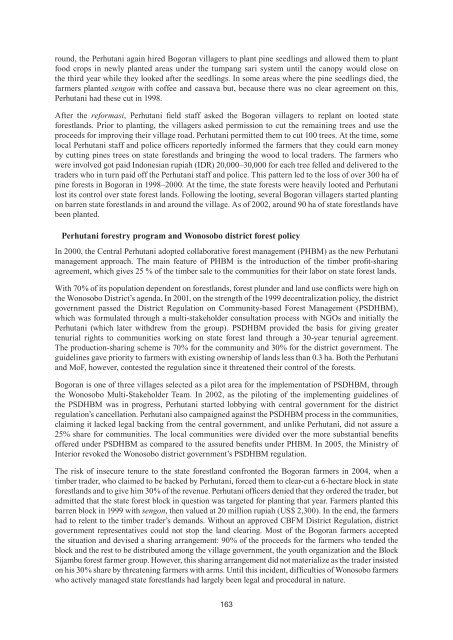Contribution of Forestry to Poverty Alleviation - APFNet
Contribution of Forestry to Poverty Alleviation - APFNet
Contribution of Forestry to Poverty Alleviation - APFNet
Create successful ePaper yourself
Turn your PDF publications into a flip-book with our unique Google optimized e-Paper software.
ound, the Perhutani again hired Bogoran villagers <strong>to</strong> plant pine seedlings and allowed them <strong>to</strong> plant<br />
food crops in newly planted areas under the tumpang sari system until the canopy would close on<br />
the third year while they looked after the seedlings. In some areas where the pine seedlings died, the<br />
farmers planted sengon with c<strong>of</strong>fee and cassava but, because there was no clear agreement on this,<br />
Perhutani had these cut in 1998.<br />
After the reformasi, Perhutani field staff asked the Bogoran villagers <strong>to</strong> replant on looted state<br />
forestlands. Prior <strong>to</strong> planting, the villagers asked permission <strong>to</strong> cut the remaining trees and use the<br />
proceeds for improving their village road. Perhutani permitted them <strong>to</strong> cut 100 trees. At the time, some<br />
local Perhutani staff and police <strong>of</strong>ficers reportedly informed the farmers that they could earn money<br />
by cutting pines trees on state forestlands and bringing the wood <strong>to</strong> local traders. The farmers who<br />
were involved got paid Indonesian rupiah (IDR) 20,000–30,000 for each tree felled and delivered <strong>to</strong> the<br />
traders who in turn paid <strong>of</strong>f the Perhutani staff and police. This pattern led <strong>to</strong> the loss <strong>of</strong> over 300 ha <strong>of</strong><br />
pine forests in Bogoran in 1998–2000. At the time, the state forests were heavily looted and Perhutani<br />
lost its control over state forest lands. Following the looting, several Bogoran villagers started planting<br />
on barren state forestlands in and around the village. As <strong>of</strong> 2002, around 90 ha <strong>of</strong> state forestlands have<br />
been planted.<br />
Perhutani forestry program and Wonosobo district forest policy<br />
In 2000, the Central Perhutani adopted collaborative forest management (PHBM) as the new Perhutani<br />
management approach. The main feature <strong>of</strong> PHBM is the introduction <strong>of</strong> the timber pr<strong>of</strong>it-sharing<br />
agreement, which gives 25 % <strong>of</strong> the timber sale <strong>to</strong> the communities for their labor on state forest lands.<br />
With 70% <strong>of</strong> its population dependent on forestlands, forest plunder and land use conflicts were high on<br />
the Wonosobo District’s agenda. In 2001, on the strength <strong>of</strong> the 1999 decentralization policy, the district<br />
government passed the District Regulation on Community-based Forest Management (PSDHBM),<br />
which was formulated through a multi-stakeholder consultation process with NGOs and initially the<br />
Perhutani (which later withdrew from the group). PSDHBM provided the basis for giving greater<br />
tenurial rights <strong>to</strong> communities working on state forest land through a 30-year tenurial agreement.<br />
The production-sharing scheme is 70% for the community and 30% for the district government. The<br />
guidelines gave priority <strong>to</strong> farmers with existing ownership <strong>of</strong> lands less than 0.3 ha. Both the Perhutani<br />
and MoF, however, contested the regulation since it threatened their control <strong>of</strong> the forests.<br />
Bogoran is one <strong>of</strong> three villages selected as a pilot area for the implementation <strong>of</strong> PSDHBM, through<br />
the Wonosobo Multi-Stakeholder Team. In 2002, as the piloting <strong>of</strong> the implementing guidelines <strong>of</strong><br />
the PSDHBM was in progress, Perhutani started lobbying with central government for the district<br />
regulation’s cancellation. Perhutani also campaigned against the PSDHBM process in the communities,<br />
claiming it lacked legal backing from the central government, and unlike Perhutani, did not assure a<br />
25% share for communities. The local communities were divided over the more substantial benefits<br />
<strong>of</strong>fered under PSDHBM as compared <strong>to</strong> the assured benefits under PHBM. In 2005, the Ministry <strong>of</strong><br />
Interior revoked the Wonosobo district government’s PSDHBM regulation.<br />
The risk <strong>of</strong> insecure tenure <strong>to</strong> the state forestland confronted the Bogoran farmers in 2004, when a<br />
timber trader, who claimed <strong>to</strong> be backed by Perhutani, forced them <strong>to</strong> clear-cut a 6-hectare block in state<br />
forestlands and <strong>to</strong> give him 30% <strong>of</strong> the revenue. Perhutani <strong>of</strong>ficers denied that they ordered the trader, but<br />
admitted that the state forest block in question was targeted for planting that year. Farmers planted this<br />
barren block in 1999 with sengon, then valued at 20 million rupiah (US$ 2,300). In the end, the farmers<br />
had <strong>to</strong> relent <strong>to</strong> the timber trader’s demands. Without an approved CBFM District Regulation, district<br />
government representatives could not s<strong>to</strong>p the land clearing. Most <strong>of</strong> the Bogoran farmers accepted<br />
the situation and devised a sharing arrangement: 90% <strong>of</strong> the proceeds for the farmers who tended the<br />
block and the rest <strong>to</strong> be distributed among the village government, the youth organization and the Block<br />
Sijambu forest farmer group. However, this sharing arrangement did not materialize as the trader insisted<br />
on his 30% share by threatening farmers with arms. Until this incident, difficulties <strong>of</strong> Wonosobo farmers<br />
who actively managed state forestlands had largely been legal and procedural in nature.<br />
163


